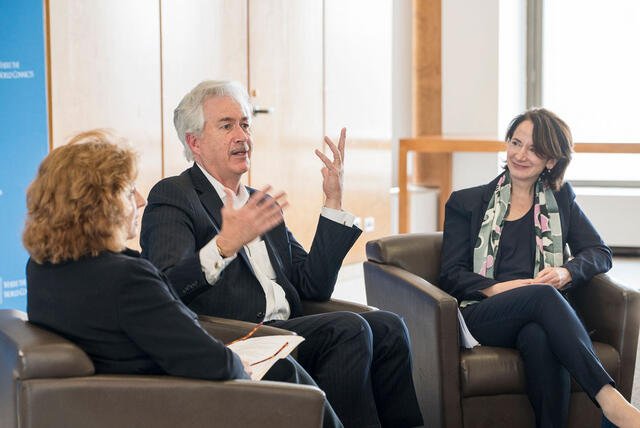
Making the Case for American Diplomacy

“Diplomacy ought to be a principal tool,” said the longtime diplomat William J. Burns in opening his recent talk at SIPA. “I am worried that we are corroding upon and squandering that asset.”
The April 8 visit marked one of the first public discussions of Burns’s new book, The Back Channel: A Memoir of American Diplomacy and the Case for its Renewal.
And few people are more qualified to talk about diplomacy. Currently president of the Carnegie Endowment for International Peace—the oldest international affairs think tank in the United States—Burns retired from U.S. Foreign Service in 2014 after a 33-year diplomatic career. He served five U.S. presidents and 10 secretaries of state during his time in government. Burns also holds the highest rank in the Foreign Service—career ambassador—and is only the second career diplomat in history to become deputy secretary of state.
Prior to his tenure as deputy secretary, Burns served from 2008 to 2011 as undersecretary for political affairs. He was ambassador to Russia from 2005 to 2008, assistant secretary of state for Near Eastern affairs from 2001 to 2005, and ambassador to Jordan from 1998 to 2001, among many other significant posts.
The event was hosted by Dean Merit E. Janow of SIPA and Avril Haines of Columbia Law School. Haines, a former deputy director of the CIA who also served as deputy national security adviser to President Obama, said the ambassador was well known, during his time in the federal government, for providing thoughtful feedback.
“Everyone always wanted to send their memos to Bill,” she said.
Haines also praised what she called Burns’s “quiet wisdom,” a quality that makes The Back Channel particularly important today. Praised by Hillary Clinton, Henry Kissinger, and Madeleine Albright among others, the book provides an inside look into American diplomacy in a variety of contexts as diverse as the war in Chechnya to meetings with Muammar Gaddafi.
Above all, it details how diplomacy is an integral foreign policy tool.
While Burns said “there is nothing perfect about American diplomacy,” he underscored that good foreign relations remain imperative to furthering U.S. interests.
“I’ve never seen a moment that mattered more [than now] in advancing U.S. diplomacy throughout the world, and we have never been more adrift,” he added.
Burns spoke unfavorably of the Trump administration’s cutbacks on diplomatic relations and attacks against career diplomats. He did not mince words when he noted the current president’s belief that only he matters in foreign negotiations is “a diplomacy of narcissism, not of institutions.”
Burns fielded inquiries on the current State Department, potential for U.S. involvement in Ukraine, and regrets that he may have had during his time in office.
In response to a question about the erosion of diplomatic institutions and relations, Burns said, “It’s not going to be enough to start repairing the damage, but it’s also important to start looking ahead.”
The sight of students and other attendees lined up to purchase Burns’s book suggests that at least some will do just that, drawing on the ambassador’s advice in the process.
— Alexandra Feldhausen MIA ’19
photo by Barbara Alper